Teams
The Ape Social Mind Lab
 Catherine Crockford (Principal Investigator,Head of lab)
Catherine Crockford (Principal Investigator,Head of lab)email: crockford@isc.cnrs.fr
Catherine Crockford is a Director of Research at the ISC CNRS in Lyon and head of the The Great Ape Social Mind Lab. A central theme of her research is assessing socio-cognitive and communicative variation across primates to provide insights into the evolution of the primate social brain and primate societies. She obtained her PhD at the Max Planck Institute for Evolutionary Anthropology and University of Leipzig in 2005 on the vocal output of wild chimpanzees. She conducted two post-doctoral positions, first with Dorothy Cheney and Robert Seyfarth at the University of Pennsylvania studying wild chacma baboon social cognition and stress in relation to social relationships, and second with Klaus Zuberbühler at St. Andrews University studying the socio-cognitive and neuroendocrine control of social relationships of wild chimpanzees, with a British Academy Fellowship. She then took up a Group Leader position at the Max Planck Institute for Evolutionary Anthropology and was awarded an ERC starter grant ‘ApeAttachement’ to examine maternal effects on social development of wild chimpanzees, before joining the CNRS. She is also a core PI in the Evolution of Brain Connectivity Project in collaboration with Max Planck Institutes for Evolutionary Anthropology and Human Cognitive Sciences. For further information, please see: https://www.eva.mpg.de/ecology/staff/catherine-crockford/
More Roman Wittig (Principal Investigator,Director of Tai Chimpanzee Project)
Roman Wittig (Principal Investigator,Director of Tai Chimpanzee Project)email: roman.wittig@isc.cnrs.fr
phone: +33 4 37 91 12 56
Roman Wittig is Director of Research at the Institute for Cognitive Sciences (UMR5229). Since 2012 he is Director of the Taï Chimpanzee Project (TCP) in Côte d’Ivoire, where wild habituated chimpanzees are observed continuously since 1979. He is Principle Investigator of the Evolution of Brain Connectivity Project (EBC) at the Max Planck Society.
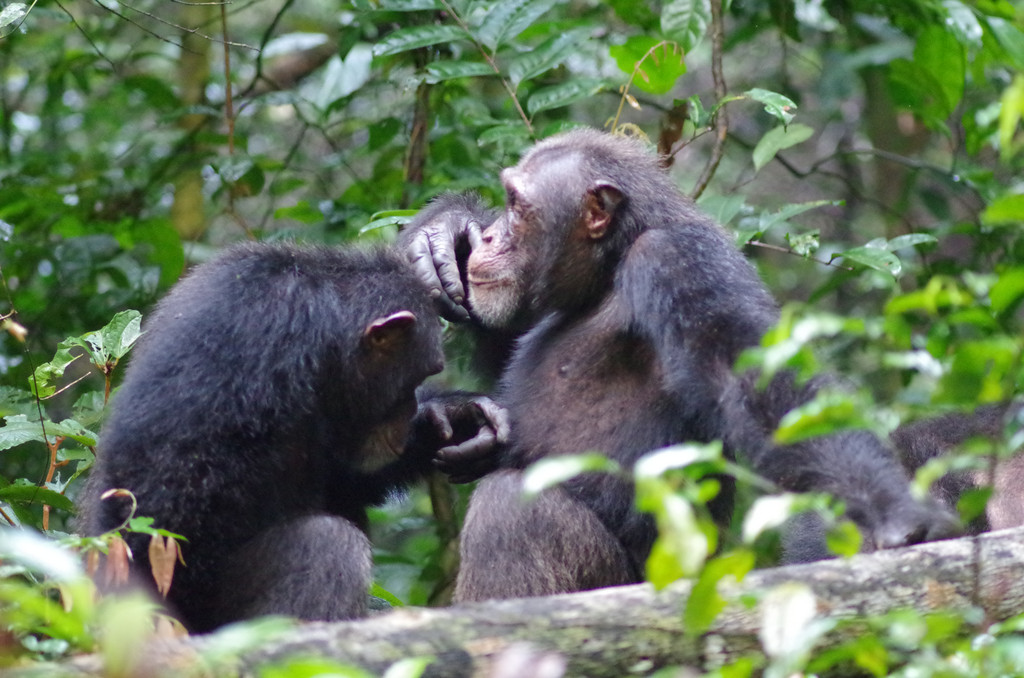
Throughout his career Roman has investigated the cognition and behaviour of our closest living relatives, chimpanzees and other non-human primates in the wild. Combining behavioural ecology with comparative psychology allowed him to examine the evolution of the human mind and to investigate the selective pressures that have shaped human brain and behaviour. Critical here was the examination of wild apes, where brains and behaviour were formed by the socio-ecology in which the animals evolved. As director of the Taï Chimpanzee Project, Côte d’Ivoire, his research on chimpanzees has provided critical insights into the evolution of the human mind and behaviour, by investigating both ultimate and proximate factors that fashion the complex aspects of chimpanzee behaviour and cognition. Insights include: (1) Friendships in non-human primates facilitate cooperation and provide fitness benefits, potentially shaping cognition; (2) Cooperation in chimpanzees works not only within dyads, but also at the group level, probably driving complex cognition; (3) Neuro-hormones promote dyadic and group-cooperation in chimpanzees, suggesting that benefits of cooperation formed neurobiology.
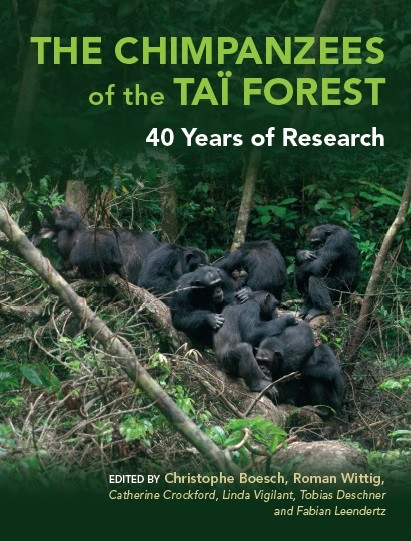
Roman has received his Doctor rerum naturalium in 2004 from the the University of Leipzig (Germany) at the Max Planck Institute for Evolutionary Anthropology (EVA) after conducting his research on Conflict management in wild chimpanzees at TCP. He observed wild chacma baboons in the Moremi Game Reserve, Okavango Delta, Botswana, for two years and Eastern chimpanzees at Budongo Conservation Field Station, Uganda, for three years. He held research positions at the Department of Biology, University of Pennsylvania, Philadelphia, USA and the School of Psychology, University of St. Andrews, Scotland, before he returned in 2011 to the MPI EVA to become Max Planck Research Group Leader. In 2021 he joint the ISC to bridge the cooperation of CNRS and MPS under the EBC, before becomming in 2022 Director of Research at the ISC.
More Tatiana Bortolato (PhD Student)
Tatiana Bortolato (PhD Student)email: tatiana_bortolato@eva.mpg.de
Tatiana Bortolato has been a PhD student since October 2018, working under the supervision of Cédric Girard-Buttoz, Catherine Crockford and Roman Wittig, and within the Evolution of Brain Connectivity Project in collaboration with Max Planck Institutes for Evolutionary Anthropology and Human Cognitive Sciences, and the ISC CNRS. Her main research interest is in the evolution of language, in particular, the development of vocal communication in chimpanzees, one of our closest living relatives. Her thesis comprises the study of the emerging complexity of the vocal repertoire across ontogeny in wild chimpanzees (Pan troglodytes verus), at the Taï National Park, Côte d’Ivoire.
More Clement Gba (PhD Student)
Clement Gba (PhD Student)My interest is in food competition studies in large mammal groups. Previous studies often neglect the influence of males due to the sex differences in the fitness priorities, with female priority being food while the priority for males is access to fertile females. Yet, males can affect food competition. To face this competition, individuals adopt behavioral strategies based on their social status by occupying spatial positions that can influence differently the time they allocate to feeding than to resting and travelling. I examined this issue in wild sooty mangabeys in the Tai National Park, Ivory Coast.
More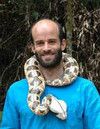 Cédric Girard-Buttoz (Post-doctoral scientist)
Cédric Girard-Buttoz (Post-doctoral scientist)email: cedric_girard@eva.mpg.de
Cédric Girard-Buttoz is a post-doctoral researcher at the Max Planck Institute for Evolutionary Anthropology (MPI EVA) and at the ISC CNRS in Lyon. His research aims at understanding the evolution of non-human primate sociality with a particular focus on cooperation, socio-cognition and communication. His work is conducted in the wild using a combination of non-invasive behavioural, physiological and field experiment approaches. He obtained his PhD at the German Primate Center and the University of Göttingen in 2013 on the physiological and behavioural cost of mating effort in wild macaques. He then conducted two post-docs at the MPI EVA, first comparing social and cooperation structures and social cognition between wild bonobos and wild chimpanzees. He then investigated the behavioural and physiological costs of maternal loss in wild chimpanzees as part of Catherine Crockford’s ERC grant ‘ApeAttachment’. At the beginning of 2021 he took up a new post-doctoral position as part of a Max Planck collaboration, in the Evolution of Brain Connectivity Project, on the complexity of primate vocal communication and correlates with relevant white matter tract size and projections. This project is comparative, operating at species, population, individual and ontogenetic levels.
More Mathilde Grampp
Mathilde Grampp..Mathilde Grampp is currently a PhD student, working under the supervision of Patrick Tkaczynski, Roman Wittig and Catherine Crockford at the University of Leipzig (and at the Taï Chimpanzee Project (TCP) and the Max Planck Institute for Evolutionary Anthropology, Leipzig, Germany). Her main research interest is to examine how behavioural flexibility relates to social complexity in two primate species: wild chimpanzees and sooty mangabeys, living in the same habitat, and in large multi-male, multi-female groups, but displaying different degrees of fission-fusion dynamics. Chimpanzees, that exhibit a higher degree of fission-fusion dynamics, may adapt their social behaviours to a larger extent to the social environment than do mangabeys. Her first chapter examines the behavioural flexibility of signalling strategies during social approaches across social contexts, including contexts presumably generating high social uncertainty between partners: fusion, post-conflict and inter-party communication events.
Previously, she conducted a study on juvenile social attention in wild vervet monkeys in South Africa (Inkawu Vervet Project), for her master thesis in ethology at the University of Strasbourg and under the supervision of Cédric Sueur, Erica van de Waal and Jennifer Botting. Then, she worked as a research assistant for the TCP and in Budongo in a wild habituated group of eastern chimpanzees (Uganda) for a study on juvenile socialisation conducted by the University of Neuchâtel..
More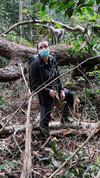 Auriane Le Floch (PhD Student)
Auriane Le Floch (PhD Student)I am a PhD student interested in non-human primate communication and particularly in unravelling call meanings in their vocal systems. I particularly focus on the meaning of call combinations by studying two habituated groups of sooty mangabeys in the Taï National Park (Ivory Coast).
https://twitter.com/aurianefloch
Some primate species can combine their calls to create new meaning, which has been recently defined as compositionality. But what are the evolutionary drivers behind the emergence of compositionality in primates? Complex social systems, for example, are suggested to promote intricate and flexible vocal communication to manage social interactions. Moreover, an expansion of vocal systems might be expected in habitats where poor visibility prevents group members from maintaining group cohesion through visual contact and/or limits effective signaling of the location of predators, such as rainforests. To explore the idea that forest environments can act as a driver of compositionality in social primates, I am currently testing if sooty mangabeys, a highly social forest monkey species, can produce meaningful call combinations. These results, compared with previous and ongoing studies on animal compositionality, will shed light on the evolution of complex communicative systems, precursors of human syntax.
I am supervised by Catherine Crockford (ISC Marc Jeannerod), Klaus Zuberbühler (University of Neuchâtel), Roman Wittig (ISC Marc Jeannerod) and Steven Moran (University of Neuchâtel).
More
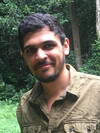 Mathieu Malherbe
Mathieu Malherbeemail: malherbe@isc.cnrs.fr
Mathieu Malherbe, formally the camp manager at the Tai Chimpanzee Project, Ivory Coast, is currently a PhD student working under the supervision of Roman Wittig and Catherine Crockford in the Ape Social Mind Lab, CNRS and at the Max Planck Institute for Evolutionary Anthropology, Leipzig, Germany, in collaboration with the Tai Chimpanzee Project. His work has a primary focus on chimpanzees culture. Culture has historically been defined as knowledge and behavior that depends upon the capacity for it to be learnt and transmitted to succeeding generations and Mathieu’s research aims at bringing more knowledge on material and social culture. In an evolutionary perspective, studying material culture in chimpanzees gives the opportunity to understand the path leading to the use of tools in hominids. Using behavioral observations and video footage, Mathieu investigates behavioral variation between four habituated neighboring communities of chimpanzees (Pan troglodytes verus) in the Tai National Park, Ivory Coast.
More Virgile Manin
Virgile ManinEmail: virgile_manin@eva.mpg.de
Virgile has been a PhD student at the Max Planck Institute for Evolutionary Anthropology (MPI EVA) since January 2018 and the ISC CNRS in Lyon since January 2021. As a behavioral ecologist, he has worked in various field sites on different species (coral, gibbons (Nomascus sp.), capuchin (Sapajus xanthosternos), chimpanzees (Pan troglodytes verus), in both conservation (ex-situ) and fundamental research domains. Virgile is primarily interested in great ape conservation and holds research is a solution to achieve those goals. During his Ph.D., he conducted behavioural and hormonal data collection while being the in-situ manager for the Tai chimpanzees Project in Tai national park, Cote d'Ivoire.
Being part of the IMPRS program at the Max Planck Institute for Evolutionary Anthropology and the Sohapi German Primate Research Group (https://www.sohapi.de/index.php), his focuses are on aspects of sociality, such as social stress, friendship and integration, and their impact on chimpanzees physiology (urinary glucocorticoid and oxytocin levels), and health (neopterin, virome).
More Oscar Nodé-Langlois (PhD Student)
Oscar Nodé-Langlois (PhD Student)I am a PhD student working on the development of socio-cognitive skills in wild chimpanzees and its neuronal substitute under the supervision of Catherine Crockford, Pier Francesco Ferrari and Angela Sirigu.
The first part of my project is focused the use of observational learning in the development of wild chimpanzees. The opportunity to learn from others is a crucial prerequisite for the emergence of culture and an important driver of cognitive evolution. Like humans, chimpanzees undergo an extended period of development, exhibit various cultural differences and evolve in complex social structures, offering, therefore, an interesting model for the study of social learning. Using behavioural observations of wild chimpanzees from the Tai National Park in Ivory Coast, this part of my PhD project aims to provide more knowledge about the contexts and the dynamics of observational social learning occurring during the development of wild chimpanzees.
The second part of this project aims to describe the organization and the development of the oxytocinergic system, a neural network involved in attachment and social attention, in the hypothalamus of wild chimpanzees using immunochemistry.
 Tina Peterson (PhD Student)
Tina Peterson (PhD Student)As a PhD student, I investigate chimpanzee tool representation under the supervision of Roman Wittig and Catherine Crockford at the Ape Social Mind Lab, CNRS, and Josep Call at the University of St Andrews. This shared supervision approach allows me to combine observational research in the Tai Forest with experimental work at the Wolfgang Koehler Primate Research Centre. My methods therefore include analyses of nut-cracking techniques, gathering sequences and tool-selection in varied scenarios. In the Tai Chimpanzee Project, my main curiosity focuses on how chimpanzees manage nutcracking resources in different social settings. Specifically, my work with the Tai chimpanzees allows me to examine how chimpanzees assign tool value and anticipate the actions from their peers based on detailed behavioural observations of their tool use, protective behaviour and gathering sequences.
More Eléonor Rolland (PhD Student)
Eléonor Rolland (PhD Student)Eléonore Rolland is currently a PhD student at the Max Planck Institute for Evolutionary Anthropology (Leipzig, Germany) working at the Ape Social Mind Lab at the CNRS of Lyon (France), and supervised by Catherine Crockford and Roman Wittig. She worked for two years as the camp manager of the field station of the Tai Chimpanzee Project in Tai National Park in Ivory Coast while collecting data for her PhD project. Based on behavioural research, she studies mother-offspring relationships in wild western chimpanzees (Pan troglodytes verus), with the aim to show similarities between human and chimpanzee attachment types. She investigates the link between secure feeling of the offspring and mothering style, as well as the development of social relationships with age.
Previously, she has obtained a master degree in Ecophysiology and Ethology at the University of Strasbourg (France) in 2018 and has worked in both fundamental research and conservation in various animal species such as koalas, sloths, dogs, African striped mice, viviparous lizards, kea parrots and more.
More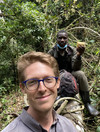 Derry Taylor (Post doc)
Derry Taylor (Post doc)Derry Taylor is a post-doctoral researcher in the Ape Social Mind Lab at the ISC CNRS, Lyon. His current focus is on the structure and organization of tool-use behavior in Western Chimpanzees within the broader context of the Evolution of Brain Connectivity Project, which aims to establish the connection between brain structure and function in hominoids. Previously, he worked as a post-doctoral researcher at the University of Neuchatel for the NCCR Evolving Language, a multi-disciplinary Swiss research project combining insights and expertise from biology, psychology, philosophy, computer science, and engineering, to better understand the past, present, and future of language. During his time in the NCCR, he developed a novel theoretical framework for social cognition research, which he tested using an innovative experimental approach with wild chimpanzees in Budongo Forest Uganda, as well as with captive apes at Basel Zoo using eye-tracking technology. He earned his PhD in 2021 from the University of Portsmouth, where he worked on chimpanzee vocal ontogeny from a bioacoustic and behavioral perspective. In addition to his mainstream academic work, Derry (in collaboration with others), has developed a new platform, a free-format online journal, which aims to provide a space for the insights and expertise of local field staff to be shared, with the aim of helping to make primatology a more socially and epistemically inclusive field (www.perspectivescollectivejournal.com).
More Antoine Valet (PhD Student)
Antoine Valet (PhD Student)Antoine Valet is a current PhD student working under the supervision of Catherine Crockford and Roman Wittig. He is part of the Ape Social Mind Lab at the ISC CNRS, is collaborating with the Tai Chimpanzee Project, and is a part of the Evolution of Brain Connectivity Project. His main focus is the evolution of language, specifically the complexity and flexibility of chimpanzees' vocal combinatorial system. Using vocal and behavioral data, Antoine’s research aims to analyze the development and the role of context-specific variant calls in vocal sequences in wild chimpanzees from the Taï population in Côte d’Ivoire. In the past, Antoine studied the flexibility of non-vocal sounds in chimpanzees from the Tacugama sanctuary in Sierra Leone, and worked for 8 months in Tai Chimpanzee Project as a field assistant. He is also a wildlife photographer.
More

